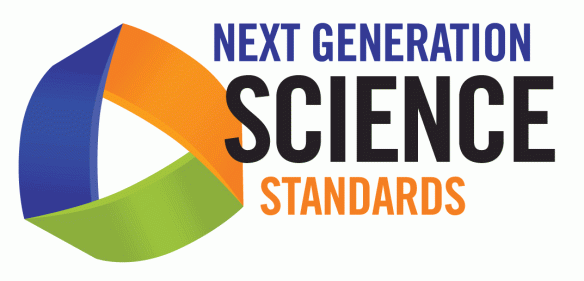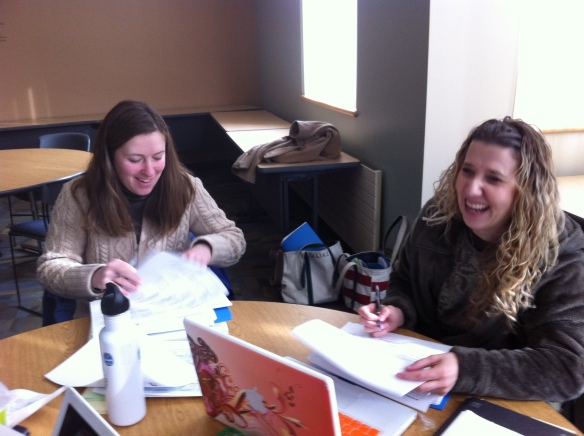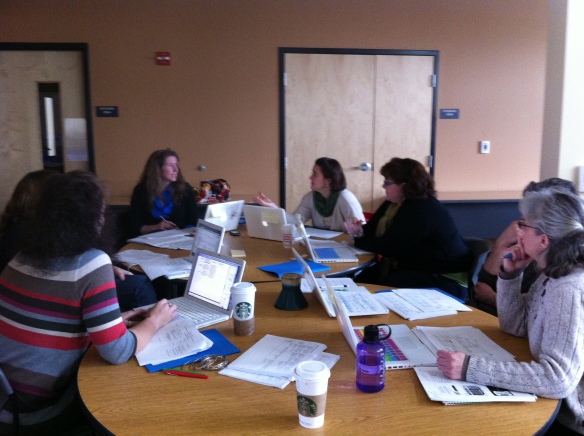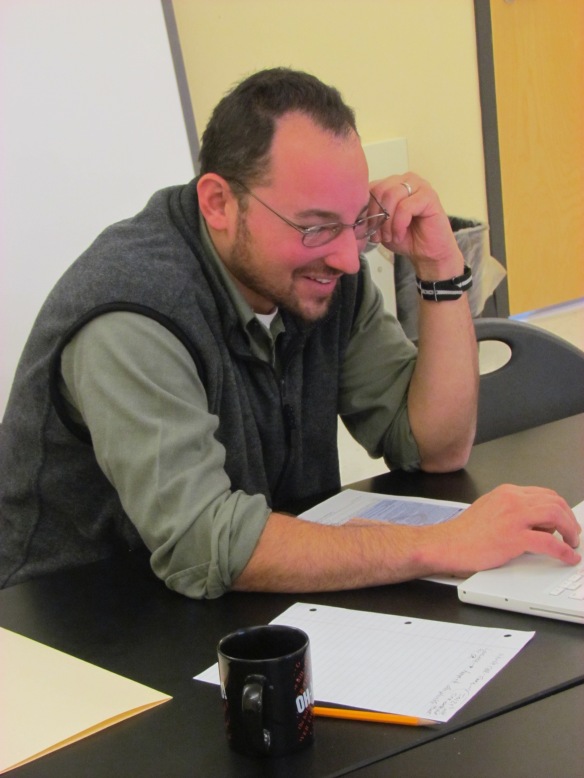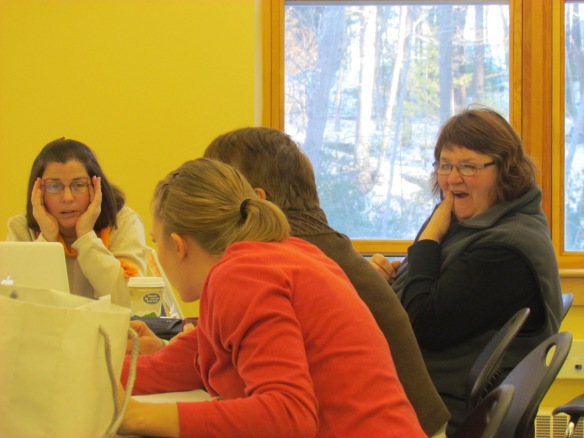Summer is a great time to get familiar or deepen your familiarity with the Next Generation Science Standards. In the last few weeks many educators across the state have contacted me asking where they can get the standards. The best resource is the NGSS page. From this page you can access the standards as well as the NGSS Appendices. The Appendices include many valuable resources for educators including Appendix D, the equity case studies; Appendix K, the Model Course Mapping for Middle and High School; and Appendices L and M, Connections to CCSS. And don’t forget . . . A Framework for K-12 Science Education continues to be a valuable resource for understanding the intent of the standards. You can access all of these resource as free downloads. What a gift!
Category Archives: NGSS Updates
Grand Challenges in Education
Achieve Releases NGSS!
The Standards are now live. Achieve released the Next Generation Science Standards today and Maine is proud to have been among the 26 Lead States that participated in the development of these standards.
The timing for this release is PERFECT. Throughout the spring and summer Maine educators can begin to acquaint themselves with NGSS and revisit the Framework for K-12 Science Education. That process should continue throughout next year. Implementing this vision is a multi-year collaborative effort. No district will be able to comprehensively and effectively transition to the NGSS over a summer.
I am already looking forward to Fall 2013. In October both the Maine Science Teachers Association and the Maine Curriculum Leaders will focus their conferences on the NGSS.
You can access the NGSS document at http://www.nextgenscience.org/.
MCCL considers NGSS
Educators in Maine regularly ask how the development of Next Generation Science Standards (NGSS) will connect with the work being done by the Maine Cohort for Customized Learning (MCCL). I attended the meeting of the MCCL Science group that met last week in Lewiston. What follows is my summary of the work that MCCL has done in science and the MCCL leadership’s picture of where the work is headed in the future.
Over the last two years, the MCCL science group has identified measurement topics for science. The measurement topics are built from the Maine Learning Results. In the spirit of plan, do, check and adjust, during the winter and spring of the 2012-2013 school year, the MCCL Science group is refining the current scopes and scales that support the identified measurement topics .
Karen Caprio, Lori Lodge and Linda Laughlin invited me to join their meeting and share information about the Next Generation Science Standards. The MCCL Science Group plans to reconvene this summer after the adoption of the NGSS. The Cohort is committed to becoming “students” of the Framework and NGSS Science standards. Using this knowledge as a base they will plan for future revisions to the MCCL work to reflect the NGSS.
A peek into Biddeford Middle School’s NGSS review conversation
Ann Putney from Biddeford Middle School (BMS) reflects on the conversations that the BMS science professional learning community (plc) had while providing feedback on the NGSS.
From Ann….
As we launched into our review, questions immediately arose about the language of the PEs. “How will the kids understand this?” was Tammy Lavigne’s first question. At BMS, the PE that is currently being worked on in a classroom is required to be posted in the room and discussed with students as the unit progresses. One of Tammy’s great strengths is her knowledge of and focus on 12-and 13-year olds, and how to best match her curriculum to them. The way in which we will communicate Performance Expectations to our charges in more student-friendly language is a question for us in the future. And… we have to remember… this IS still a draft.
“Our kids could never do that,” was a second comment. We reminded ourselves that we were looking at grade-span endpoints. Maybe the PEs are difficult to achieve at right now at BMS, we agreed, but what if we looked at the NGSS continuum from Kindergarten onward? We began with the Kindergarten standard “Structure and Properties of Matter,” to see what was introduced there. We discovered continuity in the practices, in particular and the cross-cutting concepts that built confidence among our group that a “culture of Science education” would be achieved in a comprehensive implementation of NGSS. This was a key realization for several of us in two ways: 1) that NGSS must be implemented throughout the grades, beginning in Kindergarten, and 2) that the Frameworks vision “that students, over multiple years of school, actively engage in science and engineering practices and apply crosscutting concepts to deepen their understanding of each field’s disciplinary core ideas” could be fulfilled by implementing NGSS. In other words, if the “culture” exists, yes our students will be able to do this. (A Framework for K-12 Science Education: Practices, Cross Cutting Concepts, and Core Ideas. National Academies Press, Washington, D.C. page 2)
The NGSS review process has truly been participatory. Biddeford Middle School’s teacher comments are being reviewed along with all comments from ALL states across the nation in order to ensure that the NGSS may be as workable as possible for all stakeholders, including classroom teachers in a small city in Maine.
Many thanks to my colleagues: Chelsea Brittain, Barbara Burgess, Ethan Davis, Lori Hickey and Tammy Lavigne and to BMS Principal Charles Lomonte for providing us with time to complete our review.
Maine posts great input on NGSS
Thank you to everyone who provided feedback on the second and final public draft of the Next Generation Science Standards (NGSS). I am grateful to all of you for the priority you gave to this important effort.
Maine had great participation in the NGSS survey. According to stats released by Achieve, Maine was one of the most active states in the nation based on population. Bravo!
Achieve expects to release the final document at the end of the first quarter. Keep reading the Framework!
Also, look for future posts about:
- NGSS and the Maine Cohort for Customized Learning
- What the Physical Science Partnership Grant (U Maine RiSE Center) can tell us about implementing the vision of the Framework and the NGSS
- Practices 5 and 6 and MLTI tools
- Maine Curriculum Leaders and NGSS implementation
Suggestions for reviewing and providing input to the next public draft of the Next Generation Science Standards
Reviewing the NGSS can be an overwhelming task, particularly if you do not have a significant amount of time to do so. This post provides suggestions that may be helpful to encourage quality input to the standards. Individuals may review only a portion of the standards but collectively many people across the state will have contributed to the review of the entire document.
In your review I encourage you to:
- remember that standards are an articulation of desired student outcomes; standards are not an articulation of curriculum or instructional methodology; and
- comment on both specific standards (performance expectations) and broad design features or assumptions.
To pull this off, I suggest three key steps to effectively provide input: 1. Chose a focus; 2. Collaborate and discuss with others (if possible); and 3. Provide input via the NGSS survey.
I. Choose a focus.
The NGSS is fairly lengthy and may be too much for one individual to review the entire set in the time available. Below are three suggestions for reviewing a subset of the NGSS document. You may want to review the survey questions (see III. below) and the broad design features or assumptions prior to doing your review.
Review the K-12 progression of standards through a particular core idea or topic.
For instance, review all the standards associated with the core idea Physical Science 1: Matter and its Interactions. Through all grades. This would include any standard aligned to PS1.A: Structure and Properties of Matter; PS1.B: Chemical Reactions; and PS1.C: Nuclear Processes in all grade levels. Alternatively, follow the progression of the topic Interdependent Relationships in Ecosystems (IRE). This would include all the standards in that topic through the grade spans.
Review the full set of standards (all disciplines) at a particular grade or grade span.
For instance, if you teach 5th grade science, you might review all the 5th grade topics: 5.SPM; 5.MEOE; 5.ESP; 5.SS. I recommend that you also review the same topics in grades 3 and 4 to understand and consider the progression of learning that leads to the grade 5 standards.
Review a particular discipline (LS, ESS, PS) at a grade span you are knowledgeable about.
For instance, if you are a 6-8 teacher, you might begin by looking at the 6-8 Life Science topics, including Structure and Properties of Matter, Chemical Reactions, Forces and Motion, Interactions and Forces, Energy, and Waves and Electromagnetic Radiation. Please review the similar topics for grades 3-5 to understand and consider the progression of learning that leads to the 6-8 standards.
II. Collaborate and discuss with others (if possible)
Everyone benefits from discussion their thoughts and reactions with others. If you review the NGSS individually, I encourage you to discuss your review with others. As you engage with your colleagues, please discuss both specific standards (performance expectations) and broad design features or assumptions.
The National Science Teachers Association provides one example of how to form study groups to discuss the second draft NGSS.
Whether you review the NGSS individually or with colleagues, the NGSS survey will allow you to indicate whether you are submitting an individual or organizational response.
III. Provide input via the NGSS survey.
Go to www.nextgenscience.org to access the survey. Detailed instructions for accessing, completing and submitting the survey will be available there. Please look for the sections of the survey that correspond to the sections you have reviewed. Also look for sections that ask for input on the overall NGSS or broader design features. Each section will have open comment boxes to include your thoughts not solicited in the specific questions.
Please complete the background information to indicate that you represent Maine, and whether you are responding as an individual or representing a group or organization. All responses that are submitted from Maine reviewers will be compiled by Achieve and returned to the Maine Department of Education. This feedback will be important to inform next steps here in the state.
Many thanks to Jake Foster of the Massachusetts DOE for his support with this post.
Update on second and final public draft of NGSS
I just learned from Achieve that the release of the second and final public draft of the Next Generation Science Standards (NGSS) is set for the first week in January. In recognition of the hectic schedules in December and the approaching holidays, the NGSS staff wanted to ensure all educators, stakeholders. and the public had appropriate access to the draft.
I will be sharing more information about the release of the second NGSS draft in the upcoming weeks and I encourage you to review the NGSS draft as an individual or in groups and provide feedback. The National Science Teachers Association has developed an NGSS study group packet to support educators in forming reviewing the NGSS draft.
The NGSS will be completed in March of 2013. Since the May draft release, the Lead States and the writers evaluated all feedback and worked on revising the standards. As a result, over 90% of the standards have been revised. In addition, the lead states charged the NGSS team with finalizing the definition for college and career readiness in science. The NGSS then went through a second round of revision to ensure the standards supported this definition.
Please stay tuned for more information and encourage others to become followers of the SciTech Framework website.
Update on release of second public draft of NGSS
Many of you have asked me to post the slides that Stephen Pruitt, Vice
President for Content, Research, and Development at Achieve, shared during the Maine Science Teachers Conference. I have posted them as Pruitt 2012 MSTA Presentation on the Resources page.
During the conference Stephen announced that we can expect to receive more details about the release of the second public draft after the election. Stephen also shared that Achieve hopes to release the second and final public draft of the Next Generation Science Standards by the end of November and that the final document is expected to be completed by end of the first quarter of 2013.
Certainly the strongest message that Stephen delivered at the conference is that Maine educators are doing the right thing and supporting implementation of the NGSS the right way with two actions:
1. Getting familiar with A Framework for K-12 Science Education, and
2. Providing feedback on the second draft of the NGSS.
I will share information about the how to provide feedback when Achieve provides the details.
In the meantime, National Science Teachers Association (NSTA) just published an article called “Exploring the New Standards: How to form a study group to examine the Next Generation Science Standards, second public draft.” My thanks to NSTA for their leadership in producing this great resource.
Defining college and career readiness in revised science and technology/engineering standards
Aside
I am so pleased to have my friend and colleague Jake Foster join me to share some thoughts about college and career readiness AND science. Jake works for the Massachusetts Department of Education and serves on one of the Next Generation Science Standards (NGSS) writing teams. Below is an excerpt from an article he wrote for the Massachusetts Association of Science Teachers (MAST)Newsletter. I know you will find his thinking clear and his ideas provocative.
 Many of you may now be familiar with the phrase “college and career readiness” in the context of standards. But what does it mean for science? This third article in a series on the revision of state science and technology/engineering standards will provide an overview of our developing thinking on this topic. Your input on this over the next months and in the next public draft of the Next Generation Science Standards (NGSS) will help shape this definition.
Many of you may now be familiar with the phrase “college and career readiness” in the context of standards. But what does it mean for science? This third article in a series on the revision of state science and technology/engineering standards will provide an overview of our developing thinking on this topic. Your input on this over the next months and in the next public draft of the Next Generation Science Standards (NGSS) will help shape this definition.
A college and career readiness perspective aims to define what students need to know and be able to do to succeed in college and the workplace after they graduate from high school. The Common Core State Standards (CCSS), now our state’s ELA and mathematics standards, are very purposeful in attending to college and career readiness. Defining career and college readiness in ELA and mathematics focuses on students’ next steps. “College ready” indicates the knowledge and skills a student needs to take a credit-bearing introductory ELA and mathematics course in a two- or four-year college without the need for remediation. “Career ready” indicates preparation for entry-level positions in quality jobs and career pathways that often require further education and training. For purposes of the CCSS, the knowledge and skills a student needs to be college ready and career ready are the same.
The functional definition of ‘avoid remediation in college’ is not useful in science as most colleges do not have remedial courses in science nor do most entry-level college science courses have pre-requisites. Additionally, science as a broad discipline is composed of multiple subjects through which a student can pursue any number of possible pathways; science is not as linear a subject as ELA or mathematics. This makes determinations of where to draw the line between high school and college for science a very difficult task. Keep in mind that college readiness focuses on the success of any college student taking an introductory science course, not science and engineering majors (those students will likely have additional expectations beyond general college readiness). A functional definition of “career ready” is even more difficult to define and has not yet been tackled directly.
With these challenges in mind, the 26 NGSS lead states gathered to have an initial discussion about a definition for college and career readiness in science. This meeting brought together state teams which included representatives from 2-year and 4-year post-secondary education institutions and businesses to review the draft NGSS in the context of college and career expectations. Teams met by content area to provide recommendations about whether the draft NGSS articulated a useful level of knowledge and skill for post-secondary opportunities. Most of the focus was on college readiness; it did not effectively address a career perspective.
This meeting represents an important but tentative first step to look at each discipline of science and begin to identify the line that differentiates high school from college in that particular discipline. Meeting in discipline-specific groups does not, however, allow for a definition across the full spectrum of science. Articulating a definition of college and career readiness that spans science as a whole is a key next step.
Meeting in discipline-specific groups also tends to focus on the conversation on the content of the discipline. A key question to any definition of college and career readiness is whether content is the fundamentally key component of readiness. Content is certainly important, as everyone will attest to, and researchers such as David Conley (2005) and organizations such as the College Board (2009) have noted. But what about scientific practices and process skills? ACT clearly shows through their surveys that practices are primary, with content as the context in which to apply/test those practices (http://www.act.org/research/curricsurvey.html). College Board (2009) was the first to intertwine practices with content in performance expectations in their Science Standards for College Success. There is also the work of Tai, Sadler, & Mintzes (2006) that shows opportunities for in-depth learning in high school courses, including engagement in learning experiences that are likely to draw on those practices, has a positive impact on college success. The other potential value of a focus on practices is that the practices provide more commonality across the disciplines than the particular content of each discipline. The NRC is about to release a report, Education for Life and Work: Developing Transferable Knowledge and Skills in the 21st Century, that will further contribute to this perspective by clarifying the meaning of the terms “21st century skills” and “deeper learning”, examine evidence on the links between these skills and positive outcomes in work, education and other areas of life, and identify areas of overlap between these skills and the Common Core State Standards and the National Research Council’s (NRC) Framework for K-12 Science Education. Sources such as these are going to be important in determining what components – content, practices, skills, habits of mind, or other characteristics – are important in a definition of college and career readiness for science.
College Board. (2009). Science College Board Standards for College Success™. New York, NY: College Board.
Conley, D. T. (2005). College knowledge: What it really takes for students to succeed and what we can do to get them ready. San Francisco, CA: Jossey-Bass.
Tai, R. H., Sadler, P. M., and Mintzes J. J. (2006). Factors Influencing College Science Success. Journal of College Science Teaching, 36(1): 52-56.

